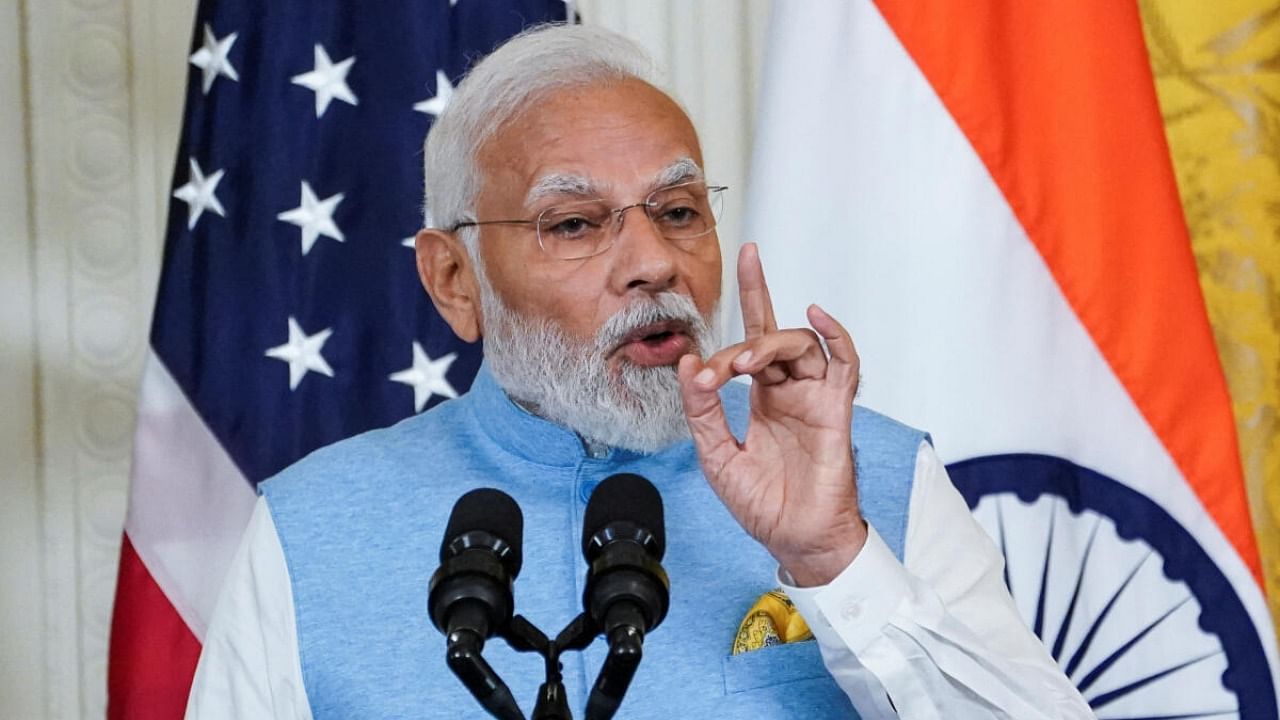
India is a democratic nation and it has no space for discrimination on the basis of caste, creed, religion, gender or region, Prime Minister Narendra Modi said after a meeting with the United States President Joe Biden at the White House on Thursday.
Biden said that he had a “good discussion” with Modi on democratic values, diversity, tolerance and religious freedom. He also noted that India and the US were different from China and both had democracies in their DNA.
The two leaders were responding to a question from a journalist on the concerns expressed by several US lawmakers over reports of alleged backsliding of democracy in India.
India and the US take pride in their diversity, Modi earlier said even as several US lawmakers urged Biden to convey to his guest concerns over reports of backsliding of democracy and growing religious intolerance in his country.
“The societies and institutions of both India and the US are based on democratic values,” Modi, who is currently on an official state visit to Washington DC, said as he was ceremonially welcomed by Biden on the South Lawn of the White House. “The constitutions of both countries begin with the three words ‘We The People’. Both countries take pride in their diversity and believe in the fundamental principle of ‘Sabka Saath Sabka Vikas’,” said the prime minister as a large number of Indian-Americans, invited to attend the ceremony, cheered for him.
The prime minister thanked the US president for opening the gate of the White House for the Indian-American community to attend the event.
As the two leaders later met for a formal meeting at the Oval Office, Biden said that he looked forward to discussing with Modi how the US and India could strengthen the partnership and build a future together, worthy of peoples of both nations, “one grounded on democracy, human rights, freedom and rule of law”. Modi seated next to Biden nodded.
Modi’s comments on the shared democratic values of the two nations came even as 75 US lawmakers – all from the ruling Democratic Party – urged Biden to convey to him the reports of “troubling signs” of backsliding of democracy in India.
Barack Obama, the former US president, too stressed in an interview to CNN on the need for protection of the rights of minorities in India. He said that had he met Modi, he would have told him that India could at some point start pulling apart if the rights of the minorities were not protected.
At least four Democrats in the House of Representatives – Rashida Tlaib, Ilhan Omar, Alexandria Ocasio Cortez and Cori Bush – announced on Twitter that they would boycott the address of the prime minister of India to the US Congress.
Modi’s address to the US Congress is going to be his second. He had earlier addressed the US Congress for the first time in 2016 when he was hosted by Obama.
“In the post-Covid era, the world order is taking a new shape. In this time period, the friendship between India and US will be instrumental in enhancing the strength of the whole world,” Modi said on the South Lawn of the White House, adding: “India and US are committed to working together for the global good and peace, stability and prosperity.”
US Senator Bernie Sanders too recently expressed concerns over allegedly shrinking space of religious minorities in the face of aggressive Hindu nationalism in India.
Several human rights organisations staged protests during the prime minister’s visit to the US, both in New York and Washington DC. They have been urging Biden to convey to Modi the concerns in the US over the alleged erosion of human rights and religious freedom and the backsliding of democracy in India. Amnesty International and Human Rights Watch planned a screening of the BBC documentary on Modi’s role as the chief minister of Gujarat during the 2002 communal clashes.
